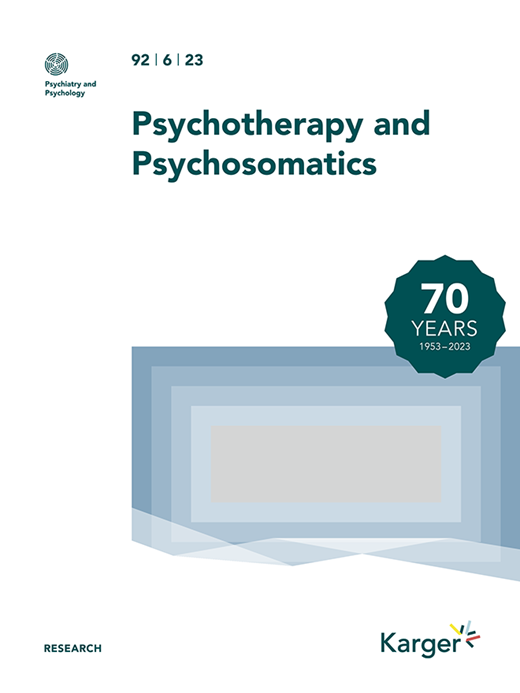The effectiveness of EMDR Therapy on PTSD symptoms and diagnostic status in patients with a personality disorder: a Randomized Controlled Trial.
IF 17.4
1区 医学
Q1 PSYCHIATRY
引用次数: 0
Abstract
Background Individuals with a personality disorder (PD) often report high exposure to adverse events. Given the strong link between negative life events and PD pathology, it is essential to evaluate trauma-focused treatments in this population. Objective This study evaluated the effectiveness of EMDR versus waitlist in reducing PTSD symptoms and diagnostic status, distinguishing between patients with and without PTSD. Secondarily, it examined the impact of EMDR on adverse event memories, both meeting and not meeting Criterion A for PTSD. Method Participants (n=159) were randomly assigned to EMDR therapy or waitlist. PDs were assessed using the Structured Clinical Interview for DSM-5. PTSD symptoms and diagnoses were evaluated using the Clinician-Administered PTSD Scale for DSM-5. Secondary analyses examined the effectiveness of EMDR on various types of memories. Results Significant group-by-time interactions showed a greater reduction in PTSD symptoms in the EMDR group, regardless of baseline PTSD diagnosis. In patients with PTSD, large effects were found post-treatment (d = 1.26; control: d = .28) and at follow-up (d = 1.5; control: d = .69). In patients without PTSD, moderate to large effects emerged post-treatment (d = .77; control: d = .18) and at follow-up (d = 1.09; control: d = .46). EMDR reduced symptoms associated with Criterion A trauma and other adverse events. Post-treatment, 65.5% of EMDR patients lost their PTSD diagnosis, increasing to 73.1% at follow-up. Conclusions EMDR effectively reduced PTSD symptoms in individuals with a PD, regardless of PTSD diagnosis, and proved effective for memories not meeting Criterion A.EMDR治疗对人格障碍患者PTSD症状和诊断状态的有效性:一项随机对照试验
背景:患有人格障碍(PD)的个体经常报告高暴露于不良事件。鉴于消极生活事件与PD病理之间的密切联系,对这一人群的创伤性治疗进行评估是必要的。目的:本研究评估EMDR与等待名单在减少PTSD症状和诊断状态方面的有效性,并区分有无PTSD患者。其次,它检查了EMDR对不良事件记忆的影响,符合和不符合创伤后应激障碍标准A。方法将159例患者随机分为EMDR治疗组和候补组。pd采用DSM-5的结构化临床访谈进行评估。PTSD的症状和诊断采用DSM-5的临床应用PTSD量表进行评估。二次分析检验了EMDR对不同类型记忆的有效性。结果:无论基线PTSD诊断如何,EMDR组的PTSD症状明显减轻。PTSD患者治疗后效果显著(d = 1.26;对照组:d = 0.28)和随访时(d = 1.5;对照组:d = 0.69)。在没有PTSD的患者中,治疗后出现了中等到较大的影响(d = .77;对照组:d = 0.18)和随访时(d = 1.09;对照组:d = 0.46)。EMDR减轻了与标准A创伤和其他不良事件相关的症状。治疗后,65.5%的EMDR患者失去了PTSD诊断,随访时增加到73.1%。结论EMDR有效地减轻了PD患者的PTSD症状,无论是否诊断为PTSD,并且对不符合标准a的记忆有效。
本文章由计算机程序翻译,如有差异,请以英文原文为准。
求助全文
约1分钟内获得全文
求助全文
来源期刊

Psychotherapy and Psychosomatics
医学-精神病学
CiteScore
29.40
自引率
6.10%
发文量
46
期刊介绍:
Psychotherapy and Psychosomatics is a reputable journal that has been published since 1953. Over the years, it has gained recognition for its independence, originality, and methodological rigor. The journal has been at the forefront of research in psychosomatic medicine, psychotherapy research, and psychopharmacology, and has contributed to the development of new lines of research in these areas. It is now ranked among the world's most cited journals in the field.
As the official journal of the International College of Psychosomatic Medicine and the World Federation for Psychotherapy, Psychotherapy and Psychosomatics serves as a platform for discussing current and controversial issues and showcasing innovations in assessment and treatment. It offers a unique forum for cutting-edge thinking at the intersection of medical and behavioral sciences, catering to both practicing clinicians and researchers.
The journal is indexed in various databases and platforms such as PubMed, MEDLINE, Web of Science, Science Citation Index, Social Sciences Citation Index, Science Citation Index Expanded, BIOSIS Previews, Google Scholar, Academic Search, and Health Research Premium Collection, among others.
 求助内容:
求助内容: 应助结果提醒方式:
应助结果提醒方式:


